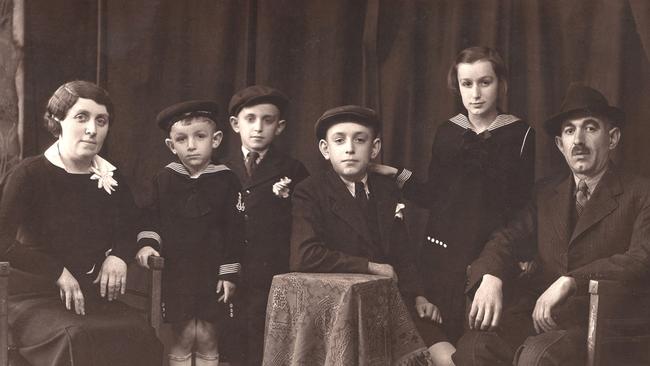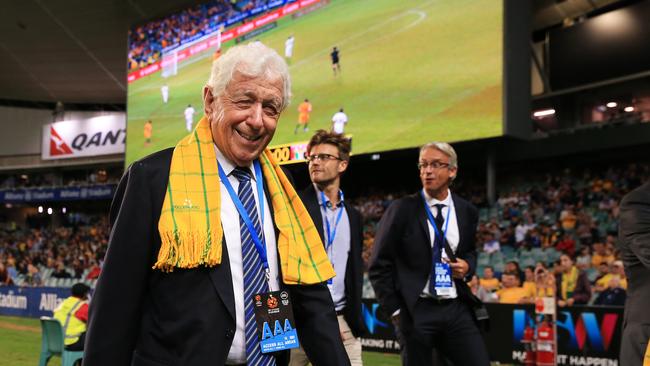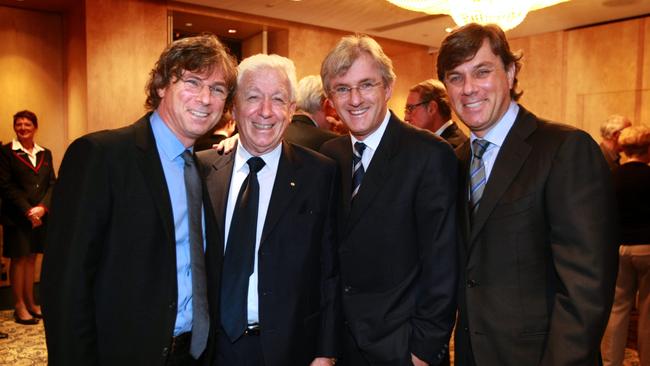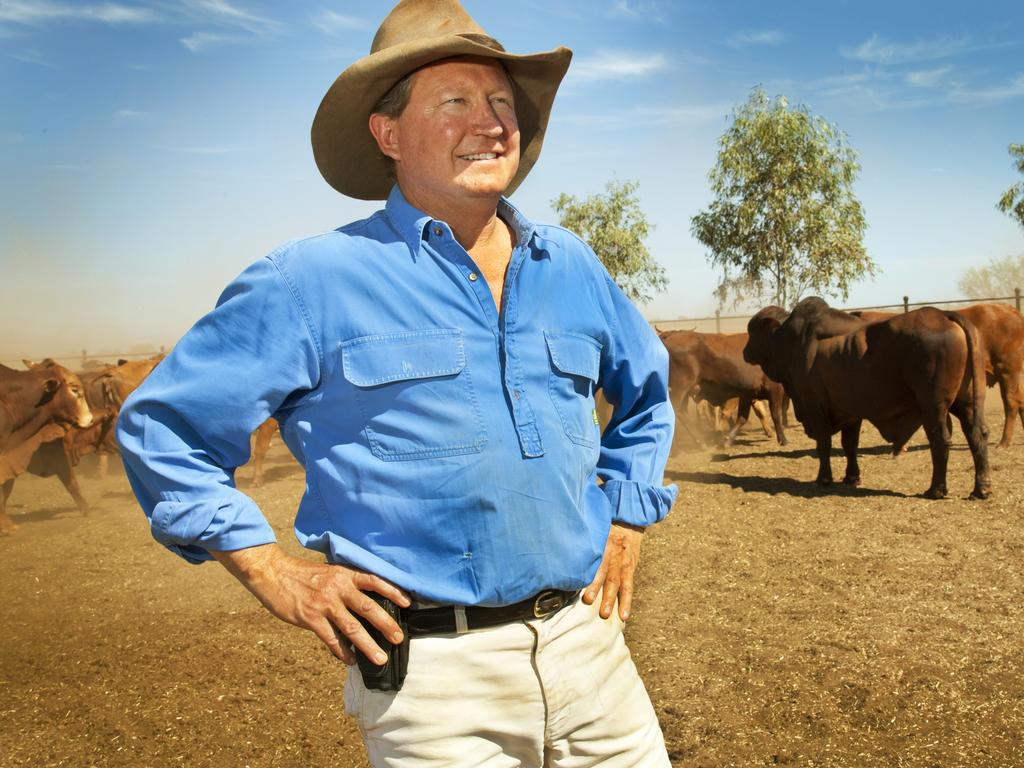Sir Frank Lowy: The Australia I love is the land of the fair go, not of anti-Semitism
From his home in Tel Aviv, Sir Frank Lowy cannot reconcile the Australia he knew with the Australia he has read about since October 7. As the nation is blighted by unprecedented levels of anti-Semitism, he reflects on the past 60 years.

Sir Frank Lowy cannot reconcile the Australia he knew with the Australia he has read about since the October 7 attack on Israel triggered the Israel-Hamas war.
From his home in Tel Aviv, Lowy, one of Australia’s most successful immigrants, has watched in despair as the country that once welcomed him with open arms as a Jewish post-war refugee has been blighted by unprecedented levels of anti-Semitism.
“I’m very disappointed because Australia is a fair country and Australian people are fair people,” he says sadly. “And that fairness has somehow lost its way.
“How does an evil like anti-Semitism find its way there?
“I have no explanation for it, I have no words for it but I am greatly disappointed. I sincerely hope this is a temporary affair.”
For Lowy, now 93, the issue is closer to his heart than most.
“I am not neutral about this,” he says. “I suffered from anti-Semitism (in the war). I lost my father and my mother lost her family through the cruelty of anti-Semitism. We need to get rid of these poisonous feelings in our society.”
See the 60 most influential people of the past six decades in The Australian’s 60th Anniversary Collector’s Edition magazine, out Saturday.
The rise of anti-Semitism since October 7 is all the more painful for Lowy because he has a deep and abiding love for Australia for giving him the opportunity to move past the horrors of his wartime childhood and build a new life here.
And what a life it turned out to be, creating the $33bn Westfield global shopping empire, transforming Australian soccer into a mainstream sport, setting up the Lowy Institute think tank and giving tens of millions of dollars away to philanthropic endeavours across the country.
Lowy has been named as one of the 60 most influential people of the past six decades in The Australian’s 60th Anniversary Collector’s Edition magazine, to be published on Saturday, in recognition of his multiple achievements and his impact on the nation’s life.
Australia was Lowy’s home for 66 years from 1952 until he moved to Israel in 2018, and he wants to remind all Australians how the country once greeted Jewish refugees like himself.
“I was welcomed immediately,” he says of arriving here at the age of 21. “I never felt like a stranger. I went to work in a factory and they accepted me; they did not ask me who I was or what language I spoke. They just said ‘What’s your name?’ I said ‘Frank’ and I was accepted. It was a very warm feeling.”
It was 1952, and in Lowy’s words, he was already an “old man” having been robbed of his childhood by war and the horrors of the Holocaust.

Lowy was forced to live in a ghetto in Hungary during World War II. His father was killed in the Auschwitz-Birkenau concentration camp and more than 100 members of his immediate and extended family also died in the Holocaust.
At the age of 15, he took an overcrowded boat alone to Palestine but it was intercepted by a British warship and he was taken to Cyprus and imprisoned.
Eventually, in 1947 at 17, he got to Palestine, where he recalls dancing in the street at the news that the UN had voted for the partition of the country, paving the way for the creation of Israel.
The following year he took up arms for the new country when it was attacked in the 1948 Arab-Israeli war and then in 1952 he left to join his mother and family, who had settled in Australia.
Opportunity vital
Lowy still recalls that day he first stepped foot in Australia to be greeted by his mother.
“On a Sunday morning in beautiful sunshine, I fell into my mother’s arms. My brother and sister were waiting for me also, so it was like coming home. It was a wonderful feeling. I was breathing fresh air; for me, it was like a miracle that the country accepted us.”
For Lowy, the chance to simply live free without the anti-Semitism that had destroyed his family was the first miracle.
The second was the opportunities his new country afforded him as he tried to make a living, first by joining with fellow European emigre John Saunders as partners in a delicatessen in 1955.
The two men established the Westfield Building Company the following year and their new shopping empire slowly began to take shape as they built modern malls that would transform the way Australians shopped.

In the decades that followed, Westfield became a retail property juggernaut, expanding to the US, Britain and beyond. At one point it was the largest retail property group in the world and in 2017 Lowy’s achievements saw him knighted by Queen Elizabeth II at Windsor Castle.
“Australia gave me a wonderful opportunity,” Lowy says.
“I worked very hard and the country was very good to me. It did not give me anything, so to speak, but it gave me the opportunity to develop myself. And that’s what I did. I developed myself and worked with many other people to create a company like Westfield.”
He says that if he arrived as a young man in Australia today, he would face different challenges to create a business empire like Westfield.
“In some ways it would be easier but in other ways it would be harder. For example, there was plenty of capital available in my time (to start a business).”
He says the enormous growth in Australia since the 1950s has made it a much more competitive business environment but he believes opportunities are still there for genuine entrepreneurs.
“Australia has changed so much from the time I arrived,” he says.
“It has become a metropolis instead of a country town. It has maybe tripled its population from 8.5 million when I arrived to about 24 million now. “This growth brings a lot of good things, and also some not-so-good things but Australia has grown into an international country.”
Kicking goals
Although Lowy is rightly proud of his business success, when he is asked about his own achievements and his influence on Australia over the past 60 years, he first nominates soccer and his philanthropic international think tank, the Lowy Institute.

When then prime minister John Howard asked Lowy to rebuild the struggling sport of soccer in 2003, few people believed it would ever become popular in a country dominated by Australian rules, rugby league and rugby union.
Yet Lowy was instrumental in turning soccer in Australia from a narrowly cast ethnic game that reflected the ethnic divisions and tensions in Europe to a truly national multicultural mainstream sport. He created the A-League with 12 clubs across the country named after their cities and towns.
The effect of his restructure could be seen on the field, and in 2006 the Socceroos qualified for the FIFA world cup for the first time in 32 years.
“It was quite a difficult thing to do, but it gave me a lot of pleasure,” he says.
“Instead of being an ethnic fight between various ethnic groups in Sydney and Melbourne, soccer has become a national sport in Australia; people now flock to the game and it has become a part of Australian life.”
Nothing has given Lowy more pleasure in recent times than watching the success of the Australian women’s Matildas soccer team in last year’s World Cup, a team of which Westfield was a longtime sponsor.
“I followed it fully and it was wonderful to see how enthusiastic Australia was for women’s soccer,” he says. “They played a very effective game and achieved considerable success.”
Two-state solution
As he has grown older, Lowy has become increasingly committed to promoting a contest of ideas in international affairs.
“Australia is a good country. Its people, its democracy, its belief in a fair go. They accepted us as immigrants and let us develop to our natural capacity and ability.”
In 2003, he set up the Lowy Institute to contribute to the international policy debate in Australia. He says the institute, which he continues to chair, is a source of enormous pride and pleasure for him even today.
“I like to participate in a country’s affairs and what bigger contribution can you make than to help make the country better, more educated and more involved in the world,” he says.
He points to the legacy of The Australian, in its 60th year, as another great contributor to public life and the national debate.
“The newspaper has made a big difference to Australia,” he says. “We didn’t have a national newspaper before, and I think every country ought to have one.
“The Australian has filled that role admirably because you get the wider picture of Australia as opposed to the state-based newspapers. It is called The Australian and it is Australian.”

The philanthropic gift of the Lowy Institute is just a part of a lifetime of giving in which Lowy and his family have donated tens of millions of dollars to a multitude of causes across the country.
“It makes life worthwhile not just to take but to give,” he explains. “When you have a little, give a little; and when you have a lot, give a lot. That’s what I’ve practised all my life. To give is a feeling of happiness, a sense of satisfaction at helping others.”
Lowy’s sunny outlook on life has been clouded of late, however, by the tragic events in the Middle East.
He has been directly impacted by the Hamas massacre of Israelis on October 7, losing two children in his extended family, twins of 12, a boy and a girl, who were murdered by the terrorists.
He says such hatred goes beyond politics and into the realm of pure evil. “I mean you can be against Israel as a country, it has its pluses and minuses like other societies everywhere. But to hate to that extent, and to be cruel to that extent is beyond me.”
He believes the only path to long-term peace in the region is for Israel ultimately to accept a two-state solution where Israel and Palestine coexist alongside each other.
He believes that the current government of Benjamin Netanyahu is a roadblock to progressing any notion of a two-state solution, but he hopes that whatever government replaces the current Netanyahu coalition will be able to begin serious discussions about achieving a two-state solution.

He is also deeply sympathetic to the suffering of the people in Gaza during this conflict and says Hamas must be defeated to give them a better future.
“They should have their own country and the terrorism has to be extradited from there,” he says. “Because the Gazans are like you and me, except they speak a different language, but they should have their own place and I hope they get it sooner rather than later.”
Although he lives in Israel, Lowy keeps in close touch with Australia, where many of his family still live. He has kept his house in Sydney’s Point Piper and visited here last December.
He plans to visit again in September. “For me, when I sold my business, I kind of retired,” he says. “Because I have no business ties, I can be where I want to be. I have practically become a free bird and a free bird likes to be free and fly, so I am doing that in my life.
“I enjoy life by travelling. God has been good to me.”
Despite his sadness about the rise in anti-Semitism in Australia, Lowy says he remains an optimist about the country and about the people he came to love.
He believes that on the world stage Australia will increasingly “be a power in Asia” and that it will continue to join with the US to fight for freedom in the Indo-Pacific and around the world.
Economically, he says “Australia is growing and it will continue to grow. There is lots of wealth in the country itself, minerals, agriculture and a lot of commercial activity”.
Fair go
Despite the events of recent months, Lowy says he still loves Australia. “Australia is a good country. Its people, its democracy, its belief in a fair go. They accepted us as immigrants and let us develop to our natural capacity and ability,” he says.
“(But) then there is the anti-Semitism that has crept in. I sincerely hope the government, associations, schools and universities will work (to combat it). And I believe they will because Australians are basically a fair people.
“It’s a good place to live and it’s where you get a fair go. What is Australia? It is a fair go.”
He adds with a smile: “And it can grow fairer, and fairer and fairer.”
See the 60 most influential people of the past six decades in The Australian’s 60th Anniversary Collector’s Edition magazine, out Saturday.




To join the conversation, please log in. Don't have an account? Register
Join the conversation, you are commenting as Logout